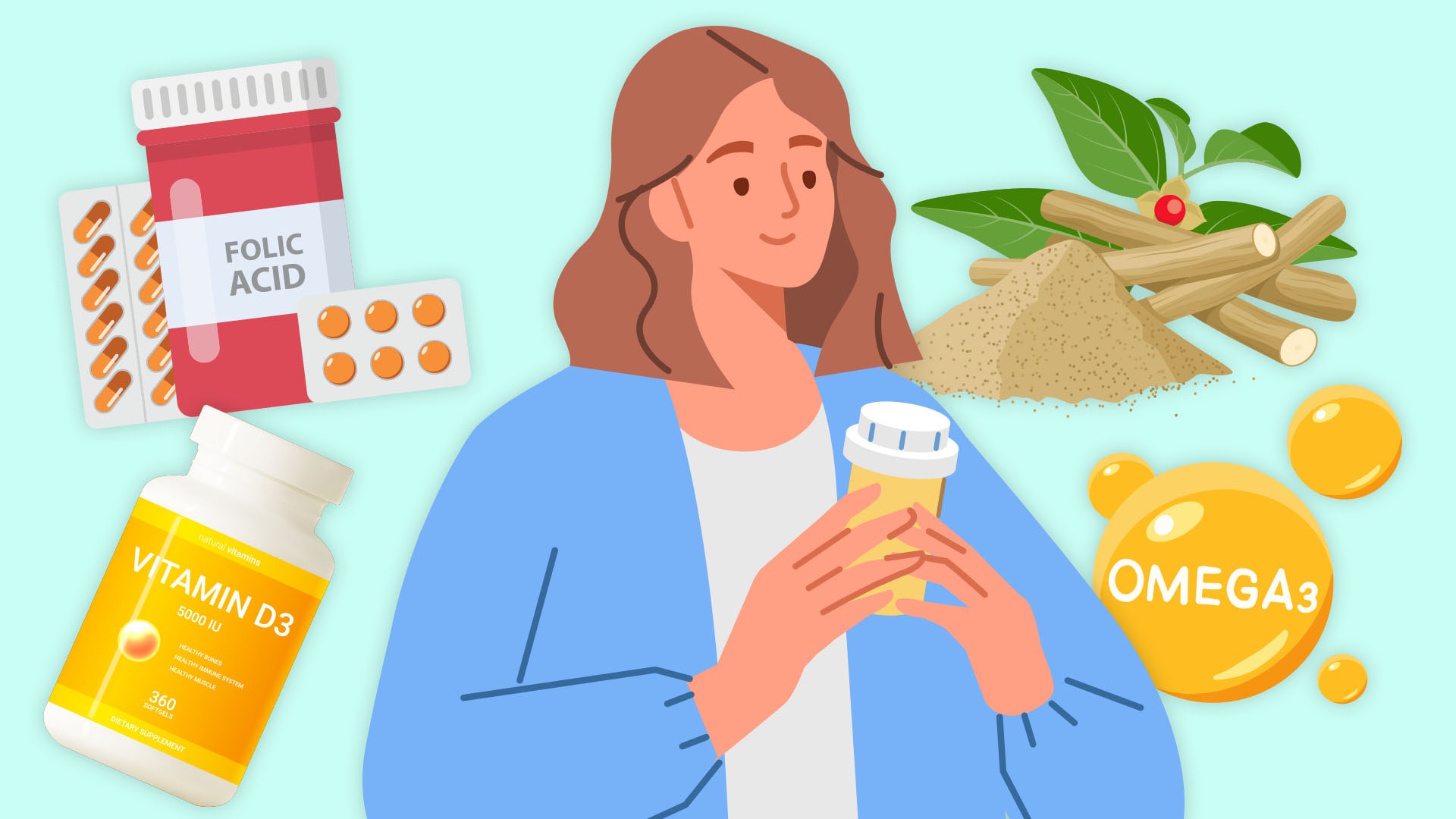SUPPLEMENTS are a great way to make sure you’re getting enough essential nutrients.
But with so many supplements to choose from, it can be hard to know which ones are best to take.
3

3
A new study found people are consuming an excessive number of vitamins minerals in pill form – not really knowing which ones are best to take.
According to nutritionist Kyle Crowley who works at Protein Works, the company that carried out the study, it’s important to understand certain supplements may be more beneficial to take during different stages of life.
Explaining the importance of women taking different supplements for changing needs in life, he said: “As women move through various life stages, their nutritional needs change, driven by hormonal shifts, lifestyle factors, and health goals.
“Rather than feeling overwhelmed, think of each stage as an opportunity to fine-tune your wellness routine, including diet, rest, exercise, and supplements, to meet your unique needs.
“Supplements can be a helpful addition, filling nutrient gaps and supporting vitality when paired with a nutritious diet and an active, balanced lifestyle.”
Protein Works has developed a basic outline of what people might want to take at each age based on science and the biological changes happening at each milestone.
This way, people have a reliable starting point to adjust their supplement intake depending on their lifestyle and goals.
In your 20s
Research suggests your 20s are often the most stressful period of life. For women, this time in life is one of transition, often marked by demanding schedules, stress from career starts, and active social lives.
Ensuring balanced energy and managing stress are key.
Recommended supplements:
- Ashwagandha – Known for its adaptogenic properties, ashwagandha may help support mental well-being and reduce anxiety by managing cortisol (stress hormone) levels. It’s a go-to for stress relief and better sleep. Cytoplan offers 60 500mg capsules for £13.50.
Supporting foods:
- Leafy greens, lean red meat, or lentils for iron.
- Whole grains, nuts, and seeds for B vitamins.
- Fresh fruits, like oranges or bell peppers, for vitamin C to enhance iron absorption.
In your 30s
Data reveals the 30s are a common age for pregnancy considerations or increased demands in both personal and professional life.
At this age, tailored nutrient intake becomes important for both immediate and future health.
Recommended supplements:
- Folic acid – Essential for women considering pregnancy, folic acid is recommended for fetal development. Intake is generally advised even if you’re not actively trying to conceive, as it supports overall cellular health by helping the body produce and maintain new cells, particularly red blood cells. Vitabiotics offers 60 tablets for £3.95.
- Calcium and vitamin D -These work together to support bone health, a foundation for the years to come. Women begin losing bone density as early as their mid-30s, so it’s important to ensure adequate intake. A recent study also found vitamin D can lower high blood pressure – a condition often called the ‘silent killer’ as it has no obvious symptoms but can lead to heart disease, kidney disease, and vascular dementia. Holland & Barrett sells 90 tablets for £3.97.
Supporting foods:
- Fortified dairy or plant-based milk and leafy greens for calcium.
- Eggs, fatty fish, or fortified cereals for vitamin D.
- Beans, spinach, and citrus fruits for folate.
In your 40s
In your 40s, some women enter perimenopause, a period marked by hormonal changes that can affect mood, energy, and sleep.
Calming nutrients can support this transition.
Recommended supplements:
- Magnesium – Known as ‘nature’s relaxant’, magnesium helps regulate mood and can ease symptoms like irritability, muscle tension, and sleep disturbances. Magnesium glycinate, in particular, is gentle on the stomach and can be helpful for better sleep. From Vitabiotics, 50 tablets is £5.95.
- Omega-3 fatty acids – These support heart health and may also help with mood regulation, given their anti-inflammatory properties. Omega-3s are beneficial in combating hormonal changes that can impact mood. Holland & Barrett sells 240 capsules for £13.39.
Supporting foods:
- Dark chocolate, nuts, and seeds for magnesium.
- Salmon, chia seeds, and walnuts for omega-3s.
In your 50s
The 50s are often a time when women transition through menopause, which can bring significant hormonal changes. Supplements that support bone density, skin health, and energy levels can be particularly beneficial.
- Vitamin E: Known to help reduce hot flashes and support skin elasticity, Vitamin E may offer relief from some common menopausal symptoms. Holland & Barrett sells 90 capsules for £6.74.
- Calcium and vitamin K2: These support bone density as Vitamin K2 works synergistically with calcium to guide the mineral to bones rather than arteries. While bone density decreases for most people with age, women are at a higher risk of developing osteoporosis compared to men due to hormonal changes during menopause that impact bone density. Together Health sells 60 capsules for £13.99.
Supporting foods:
- Avocado, nuts, and seeds for vitamin E.
- Bone broth or fish for natural sources of collagen.
- Broccoli, leafy greens, and dairy for calcium and vitamin K2.
Food v supplements
While whole foods offer similar benefits, certain life stages or dietary needs may make supplements necessary for adequate nutrition, said Crowley.
He added: “A balanced diet is key to health, but supplements can help fill gaps, especially during hormonal changes, pregnancy, or menopause.
“Whole foods remain vital for their nutrient density, addressing concerns like cost and effectiveness, yet supplements can be essential when diet alone isn’t enough.
“For example, calcium and vitamin D are two nutrients that become especially important for women as they age.
“Although dairy products, leafy greens, and fortified foods provide calcium, women often need an extra boost to reach optimal levels.
“For those who don’t get enough sun exposure or have dietary restrictions, a calcium and vitamin D supplement can be essential for maintaining strong bones through menopause.”
Crowley added: “Another common nutrient women may struggle to get enough of is iron. This is especially relevant for menstruating women, as iron is needed to replenish red blood cells and support energy levels.
“While iron-rich foods like lean meats are valuable sources, factors like heavy periods or dietary preferences can lead to lower iron levels. An iron supplement can be particularly beneficial for women prone to anaemia or fatigue, ensuring they maintain steady energy and health throughout their cycle.”
Deciding whether to take supplements
Ultimately, the decision to use supplements should be based on individual needs and circumstances.
While some can meet their needs through food alone, others may benefit from supplementation.
Crowley said: “The key is to strike a balance based on your individual circumstances.
“Each woman’s needs will differ, so it’s helpful to consult with a health professional before beginning a new supplement.”
The nasty ingredients hiding in supplements
Supplements can help us reach vitamin and mineral recommendations.
But Dr Carol Granger, a registered nutrition practitioner with a degree in biochemistry and a masters in microbiology, warns of many additions to supplements, medications and foods that could cause side effects, and suggests doing your research before buying commercial pills.
She tells Sun Health: “Ingredients like talc, E numbers, and gelatin are all used as bulking agents or as colourings and they can have serious long-term health impacts like heartburn, dizziness, fainting and severe allergic reactions.”
Here are the worst culprits:
Magnesium stearate
Unlike the name suggests, this ingredient contains no magnesium (which may help with sleep, anxiety and bone health).
Dr Granger says: “This is used as a lubricant – it prevents ingredients sticking together and means the machines that make the tablets don’t block.”
But she warns that “high amounts can cause a laxative effect and it can cause inflammation too, especially in those who are sensitive to allergies”.
It’s unlikely the small amount found in supplements is enough to do harm, but it may be worth reconsidering if you have been taking it for a long time.
Ascorbyl Palmitate
Ascorbyl palmitate is a form of vitamin C made by combining ascorbic and palmitic acids.
It’s considered safe in the amounts that are used when added to skincare.
Dr Granger says: “This is used as an antioxidant food additive and preservative meaning things with it in can have a longer use by date.”
But she claims “excess amounts can cause nausea, diarrhoea, and vomiting”.
Aspartame
You’ll may be familiar with aspartame, which is a sugar-alternative often used in things like soft drinks, sweetened diet products or other ‘low/no sugar’ foods.
Dr Granger says: “This is a sweetener a lot of people have heard of.
“It’s a flavour enhancer but because it’s an artificial sweetener, it has been linked to weight gain.”
Studies have found both that sweeteners like aspartame help people lose weight, but also gain weight by potentially increasing appetite.
Several studies have linked high intakes to more serious health problems such as cardiovascular disease, cancer, and dementia but there has been much debate about the results.
But Dr Granger claims: “It can affect metabolism so if you see it on any ingredient list, my advice would be to give it a wide berth.”
Carrageenans
Carrageenan is an ingredient that has long had concern surrounding it.
Products with it may be labelled as ‘natural’ because it is derived from seaweed, therefore it is also found in some plant-based/vegan foods.
But Dr Granger says: “The processing used to make some types of carrageenan makes it into something you definitely don’t want to consume.
“They’re widely used as gelling agent and thickener. They can be used to prevent powder clumping so may be in powder supplements you add to smoothies.
“But some cause inflammation, are really bad for digestive health and have been linked to ulcers too.
“Some can also destabilise blood sugar and cause problems with blood sugar balance.”
Calcium Phosphate
Calcium phosphate is a mineral (calcium and phosphate) which are essential for bone, muscle, blood and nerve health.
Some may benefit from additional calcium, such as menopausal women with weakening bones.
But calcium phosphate is also used as an additive to products, from supplements to toothpaste and fertilizers.
Dr Granger says: “This is used to bulk out and buffer ingredients like vitamin C.
“Side effects can include kidney problems, loss of appetite and weakness.”

3




